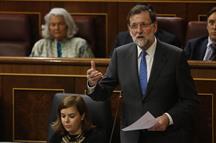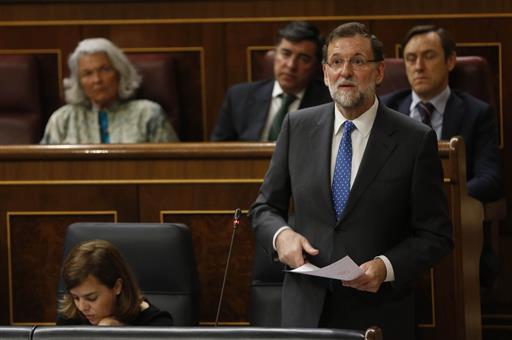Government control session
Mariano Rajoy defends progress by Government of Spain in education, health and employment
President's News - 2015.4.15
Lower House of Parliament, Madrid
In his speech during the government control session, Mariano Rajoy stressed that all Spaniards and all foreign citizens legally residing in Spain are now entitled to healthcare services for the first time ever.
The President of the Government recalled that the government expanded healthcare coverage in 2012 to include people who were previously not entitled, such as liberal professionals, and guaranteed healthcare for the unemployed who are no longer entitled to any benefits or unemployment protection. In fact, he said, "there are 800,000 more people in Spain today with a healthcare registration card than there were in 2011".
In response to the Member of Parliament for Unión, Progreso y Democracia (UPyD) [Union, Progress and Democracy], Rosa Díez, who asked about the changes to healthcare policy, Mariano Rajoy also argued that those people in an irregular situation now enjoy greater healthcare coverage than they would anywhere else in Europe. "Children have the same rights as Spanish citizens; women receive pre-natal care, care at the time of delivery and post-natal care; everyone is entitled to emergency care; in addition to the public health contingencies".
All that has changed as regards this group, he explained, is that "those people previously treated at ER facilities will be treated at primary healthcare facilities".
Furthermore, the President of the Government underlined the end to healthcare tourism that, according to the Court of Auditors, represented a burden in excess of 1 billion euros per year. He also stressed that the bills amounting to 16 billion euros owed for healthcare services have been settled and pharmaceutical spending has been brought under control.
Results from the education reform
 Pool MoncloaThe President of the Government said that the reform of the Education Act undertaken by the Government of Spain provides for "universal, public and free education" and also places emphasis on raising quality, improving labour market insertion for young people and setting common minimum learning standards throughout Spain. This was his response to a question from the Member of Parliament for the Grupo Socialista [Socialist Group], Pedro Sánchez, about the results from the government education policy.
Pool MoncloaThe President of the Government said that the reform of the Education Act undertaken by the Government of Spain provides for "universal, public and free education" and also places emphasis on raising quality, improving labour market insertion for young people and setting common minimum learning standards throughout Spain. This was his response to a question from the Member of Parliament for the Grupo Socialista [Socialist Group], Pedro Sánchez, about the results from the government education policy.
Among the progress achieved in this regard during this legislature, Mariano Rajoy stressed that the school drop-out rate has been reduced from 26.3% to 21.9%. "This is very important because there are now more young people with a chance of finding a job in the future", he said.
He also mentioned that the number of students on Vocational Training courses has risen from 610,000 in 2011-2012 to the present figure of 793,000. As regards dual Vocational Training courses, this number has increased four-fold.
Furthermore, Mariano Rajoy said that the budget allocated to grants in 2015 amounts to 1.4 billion euros, compared with 1.1 billion euros in 2011, and that the number of grant recipients in the 2013-2014 academic year is the highest it has ever been in Spain.
The President of the Government defended the position that "the same education system cannot continue to be maintained when the world is changing" and "we have a quality problem - as stated by the PISA Report - of sizable proportions".
Job creation
Mariano Rajoy stressed that his government has successfully maintained all pillars of the Welfare State during a period of extreme difficulty. "We have a public pension system like few others, an education system and social services. And the best thing is that jobs are now being created in this country".
In this regard, he said that 440,000 Spaniards found a job last year and half a million will do so this year. "If we maintain our economic policy, we could have 20 million people working in Spain in four years' time, which has to be the main objective for the years ahead".
This was the response given by the President of the Government to the Member of Parliament for Izquierda Plural [Plural Left], Cayo Lara, who asked about the claims being made by the so called 'dignity marches'.
"There is no question that we still have much work to do but this country has made a very significant leap forward in recent years and Spanish society has successfully overcome one of the most serious economic crises we have seen in many, many years", he concluded.





